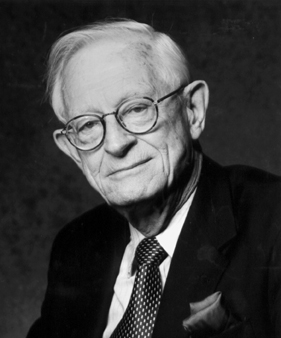Nobel Laureate Chemist To Predict Future Technologies April 3-4

Dr. Alan G. MacDiarmid, Nobel Laureate Chemist
by Judy Long
Dr. Alan G. MacDiarmid, who shared the 2000 Nobel Prize in Chemistry with Dr. Hideki Shirakawa of the Tokyo Institute of Technology and Dr. Alan Heeger of the University of Pennsylvania, will deliver the annual Gooch-Stephens Lectures April 3-4 on the Baylor University campus. The lectures are free and open to the public.
MacDiarmid will speak on "Science, People and Energy: What Does the Future Hold?" at 8 p.m. Thursday, April 3, in room 100 of the Marrs McLean Science Building. During his second lecture, he will discuss "Electronic Polymers: New Materials for the 21st Century" at 4 p.m. Friday, April 4, also in Marrs McLean 100.
MacDiarmid received the Nobel Prize for the development of an organic polymer, a plastic with the conductivity of a metal. The discovery was an entirely new phenomenon of both chemistry and physics and established the field of conducting, or electronic, polymers.
MacDiarmid is The Blanchard Professor of Chemistry at the University of Pennsylvania and The James Von Ehr Distinguished Chair in Science and Technology and professor of chemistry and physics at the University of Texas at Dallas. His current research involves the development of disposable plastic and paper electronic circuits and combining electronic organic polymers with electronic nanofibers to cultivate a new field of "nanoelectronics." He has written more than 600 research papers and holds 25 patents. He is a member of the National Academy of Science and the National Academy of Engineering.
The Gooch-Stephens Lectures Series is an endowed lecture named for past chemistry department chairs, W.T. Gooch, chair from 1909 until 1949, and W.R. Stephens, who succeeded Gooch and expanded the department to offer a doctorate in chemistry. Stephens also oversaw the construction of the current facilities in the Marrs McLean Science Building.
For more information, contact the department of chemistry and biochemistry at (254) 710-3311.